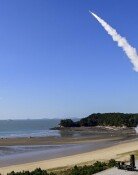Seoul must brace for Washington’s increasing isolationism
Seoul must brace for Washington’s increasing isolationism
Posted October. 06, 2023 08:51,
Updated October. 06, 2023 08:51
A recent survey has revealed that 49% of Americans oppose the idea of U.S. troops defending South Korea in the event of a North Korean invasion. This sentiment varies among political affiliations, with 53% of conservative Republican supporters opposing the idea, while 43% of Democratic supporters share the same view. These findings come from a survey conducted by the Chicago Council on Global Affairs (CCGA), which polled over 3,200 Americans last month. Support for defending South Korea has declined from 63% two years ago to the current 50%.
The reluctance of the U.S. public to endorse military intervention can be a significant variable in our national security strategy. The current administration is emphasizing a new framework for trilateral cooperation between the United States, South Korea, and Japan, built on the unity of the free world. However, this survey suggests that the immediate joint response of these three countries, not only in upholding mutual defense commitments but also in addressing North Korea's growing nuclear and missile threats, may not function as effectively as we hope.
It is a fact that there is public sentiment in the United States that questions the role of being a global policeman even after the end of the Cold War. Former President Donald Trump, a potential Republican candidate in the upcoming presidential election, has previously voiced his doubts about why a large contingent of U.S. forces is maintained in South Korea, given the substantial costs involved.
As we approach the U.S. presidential election in November next year, it is crucial to refine our national security strategy. This requires behind-the-scenes discussions with not only the Biden administration but also Republican experts who may shape Trump's potential second term. Our government should also engage in public diplomacy efforts to explain how the 70-year-old South Korea-U.S. alliance has benefited American interests to the ordinary people in the United States. Furthermore, we must be prepared for the possibility that the U.S. government may attempt to reduce the scale and alter the missions of U.S. forces stationed in South Korea against our wishes. Therefore, we should calmly proceed with the restructuring and readiness of our military.







